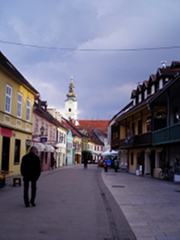|
 The first original settlement that carried the name of Zagreb lied on left bank of Medveščak stream. It enters history in 1094, when hungarian king Ladislav founded first diocese in it. Together with diocese, north from cathedral, arises also a canonical settlement (Kanonička ves) today known as Kaptol. Zagreb is also county Castrum and seat of governor.To episcopal Zagreb also belongs Vlaska street and from 1247 a part of land of Gradec, where Kaptol built its tower (Popov toranj). Near the Zagreb, on adjacent hill (nowadays known as Gornji grad) there is a fortified settlement Gradec (Grec, Grech). Both settlements, in 1242 survived Tataric intrusion. The same year, croatian-hungarian king Bela IV grants Gradec so called „Zlatna bula“ a charter which exclude citizens of Gradec from county government, but are pledge to king for military service.
The first original settlement that carried the name of Zagreb lied on left bank of Medveščak stream. It enters history in 1094, when hungarian king Ladislav founded first diocese in it. Together with diocese, north from cathedral, arises also a canonical settlement (Kanonička ves) today known as Kaptol. Zagreb is also county Castrum and seat of governor.To episcopal Zagreb also belongs Vlaska street and from 1247 a part of land of Gradec, where Kaptol built its tower (Popov toranj). Near the Zagreb, on adjacent hill (nowadays known as Gornji grad) there is a fortified settlement Gradec (Grec, Grech). Both settlements, in 1242 survived Tataric intrusion. The same year, croatian-hungarian king Bela IV grants Gradec so called „Zlatna bula“ a charter which exclude citizens of Gradec from county government, but are pledge to king for military service.
Immediately after tataric retreat citizen are starting to built the walls around Gradec. Fortifying is mostly done by 1266; bastions with towers surrounded city in shape of triangle. Beneath these walls arises new suburbs called Šoštarska ves and Nova varoška ves (today Ilica), and from 1334 on church estate north of Kaptol, Nova ves. In XV century ottomans are beginning to attack this region and king Matija Korvin, 1469 allows the bishop to fortify the Kaptol. Walls with towers,which surround city in form of quadrangle are done 1478, and walls around very cathedral were done by bishop Toma Bakač, the administrator of Zagreb diocese.
Although the Kaptol and Gradec (in 1609 got its own statue) are two separate communities, form XVI century gradually, name „Zagreb“ is in use for both communities. From that period Zagreb is political and capital center of Croatia and Slavonija which is stated so in parliament 1557. Croatian governors till beginning XVII century did not rule in Zagreb, and first to so was Nikola Frankopan 1621. Summon from parliament, in 1606 Jesuits came in Zagreb from Ljubljana and brought printing house with them. Very next year they founded academy and lecture philosophy, theology and low. In course of XVII and XVIII century Zagreb was destroyed several times by great fires (1645, 1674, 1706, 1731) and devastated by plaque (1647, 1682).
In XIX century begins fast economical, cultural and political development of Zagreb. Differences between two cities (Kaptol and Gradec) are slowly erased, especially under influence of Croatian national renaissance.
Cultural development in XIX century is marked by establishing: Musical academy 1829., Yugoslav academy of arts and sciences 1866., University of Zagreb 1874., first railway in Zagreb 1862.Industrial development begins in middle of XIX century with more than 100 machine, textile, food and graphics companies. In 1926. first radio was on the air. Before II world war Zagreb is capital of Banovina Croatia and center of resistance against nazism. After II world war Zagreb is capital city of federative republic of Croatia in Yugoslavia. Inspite of cultural and economical oppression in communist Yougoslavia, Zagreb becomes focal point of cultural pride and national identity.
Since 1991. Zagreb is a capital of independent Republic of Croatia and is steering all it's efforts and aspires becoming European metropolis.
|

